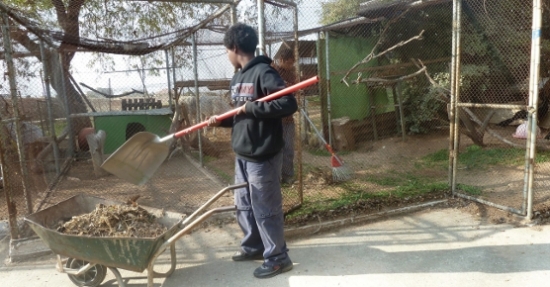
Young offenders care for exotic birds in the hope of becoming good citizens at the Wing of Love wildlife sanctuary
Bare-faced curassows, a spectacular species of large South American game birds, have curly crest feathers and bare black faces. The male, usually the more flamboyant bird compared to the female, is black with a contrasting bright yellow bill and a white breast. But the female is more impressive, with her white crest feathers tipped with black curls, horizontal pinstripes on her upper body, rust-colored breast, and reddish legs. One pair of this species, listed by the International Union for Conservation of Nature as of "high conservation priority", has been breeding successfully in the Wing of Love wildlife park for some years, fed and cared for by a group of teenage boys who were young offenders aged 14 to 18.
Out in the wild in a Brazilian forest, a curassow chick with crooked legs would not survive, but in the park the boys want to help it. “You have three choices,” Boaz Miller, the park manager told the boys. “You can put the chick outside the park in the bushes and let it fend for itself, or you can put it in the coon’s enclosure and the coon will eat it for dinner. Alternatively, you can give it food and water and create the best conditions possible for it to survive in captivity.” One of the boys, a Bedouin youth from southern Israel, knew that there was actually only one solution: “One should not help put a chick to death because its legs are crooked. Many people too have physical difficulties and it is our duty as humans to give them food and drink and love, to enable them to live their lives without fear and in peace.” The situation provided a lesson in empathy, a talent that often goes unnoticed in young offenders.
The boys, who work in the eight acre Wing of Love wildlife sanctuary at Kibbutz Kfar Menachem in the northern Negev, also care for other spectacular birds from the same family as the curassows, including some brightly-colored, long-tailed pheasants, which are often depicted in the art of the Far East. Another park resident is the vulturine guinea fowl from southern Ethiopia whose head is unbelievably ugly but whose body is especially beautiful. The blue, green and totally white peacocks and a variety of quails also belong to this same international bird family.
These exotic birds, like the teenage boys who care for them, are each very different and yet they all have much in common. The birds and the boys have different names, sizes and colors like different foods, and are sometimes aggressive. Taken out of their natural habitat, the birds and the boys coexist with the deer, onyxes and other mammals in the park. But unlike the unusual animals, the boys will eventually leave the sheltered environment, free to become productive members of society if they abide by the rules.
While the birds are housed in locked enclosures, the park is an alternative to the lockup for the boys who have been taken out of their own homes by court order. They have failed in school and engaged in antisocial activities, to their families’ despair. Their criminal records relate mostly to acts of violence against others and damage to property. These boys should use their stay in the park to finish their schooling, gain vocational skills, make new friends and contribute to society. Those who do not make the most of this opportunity will likely spend their lives excluded from their natural homes, like the birds, and end up in and out of jail.
Ineffectual parenting with poor supervision and little warmth, untreated conduct disorders, often combined with socio-economic disadvantages and learning difficulties, are known risk factors for adolescent criminal activity. A British study has shown that among those who committed their first offence between the ages of 10 and 13, 91% became repeat offenders compared with only 37% of those who first offended between the ages of 21 and 30. In Israel, just as in other countries, the age for a first offence is dropping and the number of adolescent delinquents is rising. The cost of such crimes to our society includes the activities of the police and prisons service and those of the juvenile courts. Add to this the cost that falls on the victims of the crimes, including the value of stolen or damaged property and the value attributed to the emotional and physical impact of the crime on the victims. In addition, many Israelis pay or volunteer for neighborhood-watch services. No one has estimated the lifetime costs of crime committed by a single prolific offender in Israel, but the UK’s Sainsbury Center for Mental Health claims that in the USA in 2007 it was 2.1 – 3.9 million dollars, and in the UK in 2009, it was 1.1 – 1.9 million pounds. Clearly it is better to try to prevent adolescents from becoming serial offenders as soon as possible, for humanitarian as much as financial reasons.
“If we want a better society we need to help these youngsters,” says Nissim Smadja, a supervisor for Israel’s Ministry of Social Affairs and Social Services, in referring to the responsibility of both the State and its people to provide a solution for these children, most of whom are boys (girls are more often the victims). Some 9000 young offenders, mostly boys, reach the juvenile courts each year in Israel. About 1000 of these are taken out of their homes by court order and sent either to a locked facility (an alternative for lockup), a detoxification center or to a hostel or boarding school. Fifty nine different residential frameworks house the distressed youths, and at the same time aim to help them to change their ways and re-enter society, by providing them with remedial education, vocational skills, and life skills.
Mr. Smadja admits that the government reduced its budget and its responsibility for these youths when it farmed out the running of most of these frameworks to nonprofit organizations, such as Wing of Love. It expects the nonprofits to fundraise to provide more than the most basic services. “The nonprofits have brought added value to the care of the young offenders, creating diverse and more creative solutions such as caring for the rare birds at Wing of Love, challenging outdoor activities, and business-oriented programs,” says Smadja. The Ministry’s budget for its Youth-in-Care department amounted to NIS 112,810 million ($29,700 million) of tax payers’ money in 2009 and this sum is rising yearly.
The boys’ day in the park is divided between classroom lessons where they can catch up on their school studies in small groups and outdoor work where they feed the animals, clean out the enclosures, maintain the park and gain work skills. Their program also includes sport, team building, individual mentoring and social activities. After 12 to 18 months in the program each boy is assessed for his readiness to engage in work outside the sheltered park. Wing of Love staff find him a part-time job outside the framework so that he can continue his studies while earning money and learning how to manage in the real work place. Wing of Love helps the boys find their place in society by enlisting in the IDF, engaging in voluntary service, or entering the work market when they are ready to leave.
Research in Israel and abroad has shown that the best intervention programs can reduce offending by 50% or more. Wing of Love is trying to show that, with the help of animals, it can do better. But it is not an easy job.
Michele Klein works to rehabilitate young offenders by volunteering at the nonprofit Wing of Love organization.
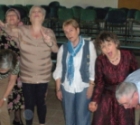 Let’s have a bit of Playback
Let’s have a bit of Playback-1372659501.jpg) Buying New Construction in Israel
Buying New Construction in Israel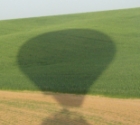 A lot of hot air - ballooning
A lot of hot air - ballooning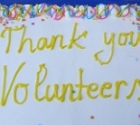 A new website in English - on Volunteering - Launched in Israel
A new website in English - on Volunteering - Launched in Israel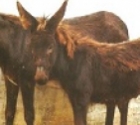 Help Needed for Abused Horses and Donkeys
Help Needed for Abused Horses and Donkeys Heather's Heseg
Heather's Heseg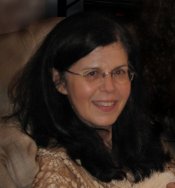 Michele Klein
Michele Klein